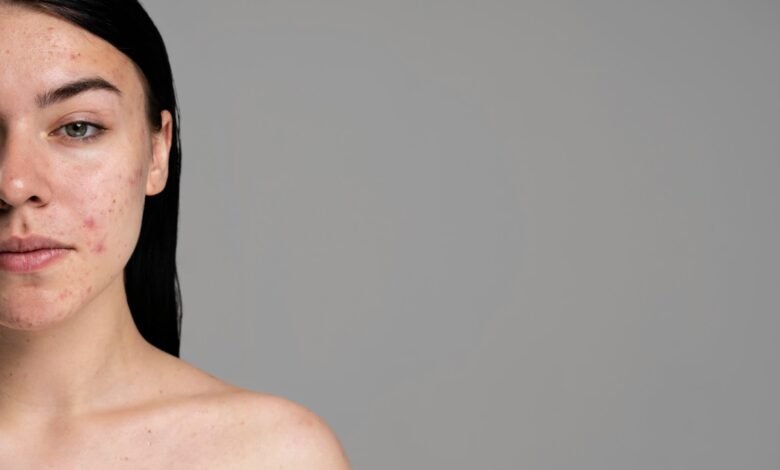Understanding the Real Causes of Acne & How to Treat It Effectively

Acne can be more than just a skin concern—it can affect your confidence, mood, and even your day-to-day decisions. If you’ve ever woken up with an unexpected breakout before a big meeting or social event, you know the struggle is real. The truth is, acne isn’t just a teenage problem. It can strike in your 20s, 30s, and beyond. But the good news? With the right information and care, you can take control of your skin.
In this blog, we’ll explore the causes, concerns, and most effective treatments for acne so you can finally say goodbye to those stubborn breakouts.
What Exactly Is Acne?
Acne is a common skin condition that occurs when your pores become clogged with oil, dead skin cells, and bacteria. These clogs can result in different types of blemishes—whiteheads, blackheads, papules, pustules, nodules, or cysts—each varying in severity.
While acne isn’t harmful in itself, untreated breakouts can lead to inflammation, scarring, and uneven skin tone, making early prevention and consistent treatment essential.
What Causes Acne?
Understanding the underlying causes of acne is key to treating it effectively. Here are the top contributors:
1. Excess Oil Production
Your skin naturally produces oil (sebum) to stay hydrated. However, hormonal fluctuations or genetics can cause overproduction, which clogs pores and attracts acne-causing bacteria.
2. Hormonal Imbalances
Hormonal shifts during puberty, menstruation, pregnancy, or stress can trigger oil glands, leading to breakouts, especially along the jawline and chin.
3. Dead Skin Cell Buildup
When dead skin cells aren’t properly shed, they combine with oil and clog your pores. This is why gentle exfoliation is so important in any men’s acne face wash routine.
4. Bacteria
The Cutibacterium acnes bacteria thrive in clogged pores and contribute to inflammation and the formation of red, swollen pimples.
5. Skincare & Lifestyle Habits
Using pore-clogging makeup, skipping cleansing, or even over-washing your face can worsen acne. Diets high in dairy or sugar, lack of sleep, and high stress levels also play a role.
Common Acne Concerns
Acne doesn’t just stop at breakouts. It can lead to long-term concerns such as:
- Post-Acne Marks: Dark spots or red patches that linger after pimples heal
- Scarring: Indentations or raised marks caused by picking or severe inflammation
- Uneven Texture: Skin may feel bumpy or rough
- Emotional Impact: Low self-esteem and stress due to persistent skin issues
These concerns are valid and treatable with the right approach.
Effective Acne Treatments That Work
There’s no “one-size-fits-all” fix for acne, but these dermatologist-approved methods and acne treatment products can help:
1. Use the Right Cleanser
Start with a gentle, non-comedogenic (non-pore-clogging) cleanser. Avoid harsh soaps or alcohol-based products that strip your skin.
2. Incorporate Active Ingredients
These ingredients target acne at its source:
- Salicylic Acid: Exfoliates inside the pores to clear clogs
- Benzoyl Peroxide: Fights bacteria and reduces inflammation
- Niacinamide: Calms redness and regulates oil production
- Retinoids: Promote cell turnover and prevent clogged pores
- Azelaic Acid: Fades dark spots and reduces inflammation
Always patch test new products and introduce them slowly into your routine.
3. Moisturize Daily
Even oily or acne-prone skin needs hydration. Choose lightweight, oil-free moisturizers to maintain a balanced skin barrier.
4. Protect with Sunscreen
UV rays can worsen acne and cause dark marks to stay longer. Use a non-comedogenic sunscreen every day—even when it’s cloudy.
5. Spot Treat (Carefully)
Apply concentrated acne treatments directly on blemishes to reduce their size and redness faster. Look for sulfur, salicylic acid, or benzoyl peroxide in your spot treatment.
6. Seek Professional Help if Needed
If your acne is painful, persistent, or scarring, consult a dermatologist. Prescription-strength retinoids, antibiotics, or treatments like chemical peels and laser therapy can be game-changers.
Final Thoughts
Acne may be common, but that doesn’t mean you have to live with it. With a better understanding of the causes and a targeted treatment plan, clear, healthy skin is within reach.
Be patient, be consistent, and most importantly, be kind to your skin. It’s working hard every day to protect you. Now it’s your turn to protect it.



